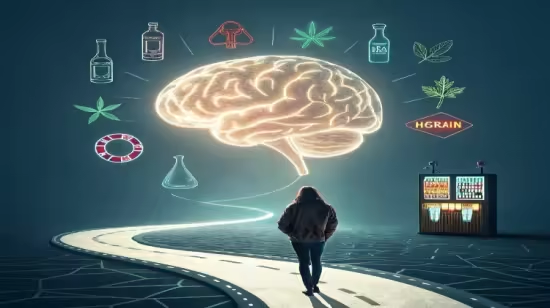
Free Download Udemy - The Addictive Brain How Addiction Rewires the Mind
Published 5/2025
MP4 | Video: h264, 1280x720 | Audio: AAC, 44.1 KHz, 2 Ch
Language: English | Duration: 57m | Size: 441 MB
Exploring the Neuroscience, Psychology, and Treatment of habit Addiction
What you'll learn
How Addiction Affects the Brain .
Substance Addictions - Alcohol, nicotine, opioids, stimulants
Behavioral Addictions - Gambling,
Genetics and Addiction
Requirements
Basic Psychology or Neuroscience
Interest in Addiction Science (
Description
Addiction neuroscience is a field dedicated to understanding how addictive substances and behaviors affect the brain and contribute to compulsive use despite negative consequences. This exploration combines principles from psychology, neurobiology, pharmacology, and behavioral science to uncover the mechanisms that underlie addiction.Neuroplasticity and Recovery: What the Science SaysThis course is for educational purposes only and does not provide medical or psychological treatment. It is not a substitute for professional help or diagnosis.At the core of addiction is the brain's reward system, particularly involving structures such as the nucleus accumbens, prefrontal cortex, and the neurotransmitter dopamine. When an individual engages in drug use or addictive behavior, dopamine levels spike, reinforcing the activity and creating a strong sense of pleasure. Over time, the brain adjusts by reducing dopamine sensitivity, which diminishes the individual's ability to experience pleasure from everyday activities and increases dependence on the addictive substance or behavior.Addiction also alters the brain's executive control systems, especially in the prefrontal cortex, impairing judgment, decision-making, and impulse control. This is why individuals struggling with addiction often continue harmful behavior even when they are aware of the consequences. Neuroscientific studies using brain imaging and animal models have revealed how prolonged exposure to addictive substances can cause long-term changes in neural circuits.Understanding these changes is crucial for developing effective treatments. For instance, medications that regulate dopamine or glutamate levels, behavioral therapies that rebuild cognitive control, and even neuromodulation techniques like transcranial magnetic stimulation are being explored as potential interventions.Moreover, addiction neuroscience emphasizes that addiction is a brain disorder, not simply a moral failing or lack of willpower. This perspective helps reduce stigma and encourages more compassionate, science-based approaches to prevention and recovery.In summary, addiction neuroscience provides valuable insight into the biological basis of addictive behavior, supporting the development of targeted treatments and more empathetic societal responses.Addiction is more than just a habit-it's a powerful neurological condition that rewires the brain. This course, at the biological, psychological, and social factors contributing to addiction.Through engaging lectures, you will learn how different substances-such as alcohol, nicotine, opioids, stimulants, and marijuana-affect the brain. The course also explores behavioral addictions like gambling and their impact on neural pathways. It addresses crucial topics such as genetic predisposition, the role of dopamine, and the latest research on addiction treatment and recovery.By the end of this course, you will have a scientific understanding of addiction, its causes, and potential treatment approaches. Whether you are a student, a healthcare professional, or someone interested in learning more about addiction, this course will provide valuable insights into one of the most pressing public health challenges of our time.Topics Covered: The Neuroscience of Reward and Addiction How Drugs Hijack the Brain's Natural Functions The Role of Genetics in Addiction Susceptibility Caffeine, Nicotine, Alcohol, and Their Effects Behavioral Addictions: The Gambler's Brain Treatment Strategies and Recovery
Who this course is for
Psychology & Neuroscience Students
Healthcare & Counseling Professionals
Educators & Parents
Individuals Struggling with Behavioral Addictions
Homepage
Code:
Bitte
Anmelden
oder
Registrieren
um Code Inhalt zu sehen!
Recommend Download Link Hight Speed | Please Say Thanks Keep Topic Live
Code:
Bitte
Anmelden
oder
Registrieren
um Code Inhalt zu sehen!